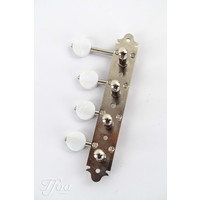

ESP® is a registered trademark of ESP Company, Limited.Electroswitch® is a registered trademark of Electroswitch Corporation.D'Angelico® Deluxe Atlantic®, Deluxe Bedford®, Deluxe Brighton®, Deluxe Ludlow®, Premier Bedford®, Premier Brighton®, Premier Ludlow® is a registered trademark of D&squo Angelico Guitars Of America.


and are not to be represented as products of the following companies unless otherwise noted. WD replacement parts are made by or for WD Music Products, Inc. Kluson®, the Kluson logo, Kluson stylized K, Kluson pinstripes and logo / artwork design(s), are registered trademarks of WD Music Products, Inc.Īll other trademarks, service marks and trade names present on this site are trademarks or registered trademarks of their respective owners. From the discovery of Carbon-14 to radiocarbon dating of fossils, we can see what an essential role Carbon has played and continues to play in our lives today.WD®, the WD logo, and logo / artwork design(s), are registered trademarks of WD Music Products, Inc.

Although it may be seen as outdated, many labs still use Libby's half-life in order to stay consistent in publications and calculations within the laboratory. We now use what is known as the Cambridge half-life of 5730+/- 40 years for Carbon-14. Throughout the years, measurement tools have become more technologically advanced, allowing researchers to be more precise. From that point on, scientists have used these techniques to examine fossils, rocks, and ocean currents as well as to determine age and event timing. The accuracy of this proposal was proven by dating a piece of wood from an Ancient Egyptian barge, the age of which was already known. Using this hypothesis, the initial half-life he determined was 5568, give or take 30 years. Using this finding, Willard Libby and his team at the University of Chicago proposed that Carbon-14 was unstable and underwent a total of 14 disintegrations per minute per gram. They found a form, an isotope, of Carbon that contained 8 neutrons and 6 protons. In 1940, Martin Kamen and Sam Ruben at the University of California, Berkeley Radiation Laboratory did just that. Before Radiocarbon dating was discovered, someone had to find the existence of the 14C isotope.
Mandolin tuner replacements series#
He demonstrated the accuracy of radiocarbon dating by accurately estimating the age of wood from a series of samples for which the age was known, including an ancient Egyptian royal barge dating from 1850 BCE. In 1960, Libby was awarded the Nobel Prize in chemistry for this work. Libby estimated that the steady-state radioactivity concentration of exchangeable carbon-14 would be about 14 disintegrations per minute (dpm) per gram. Emilio Segrè asserted in his autobiography that Enrico Fermi suggested the concept to Libby at a seminar in Chicago that year. The technique of radiocarbon dating was developed by Willard Libby and his colleagues at the University of Chicago in 1949.


 0 kommentar(er)
0 kommentar(er)
